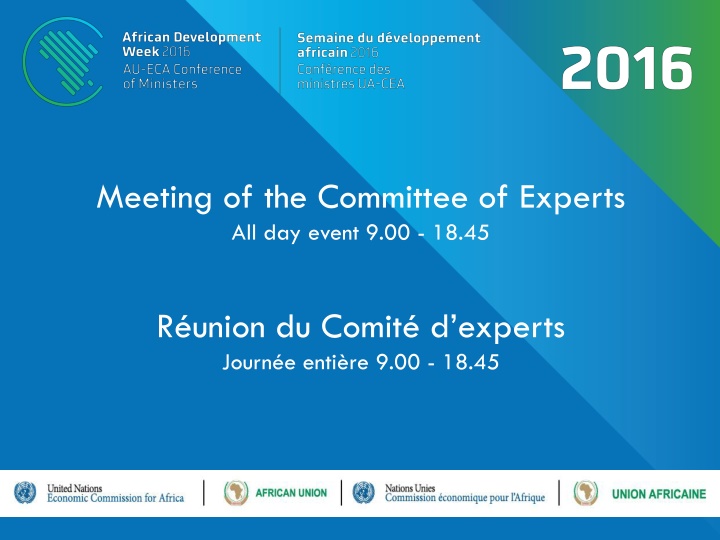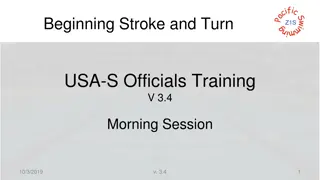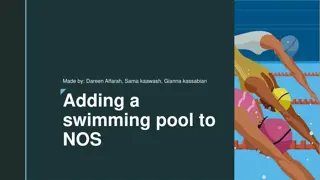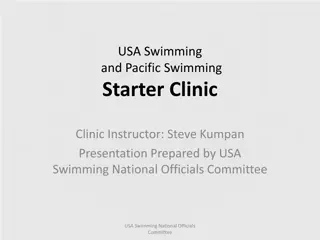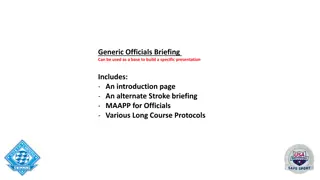Thame Swimming Club Annual General Meeting
Thame Swimming Club is holding its Annual General Meeting on 3rd July 2024. The meeting agenda includes updates from the chair and treasurer, reports from committee members and the head coach, election of committee members, and a session for questions and feedback. The club's vision is to inspire swimmers to reach their full potential in a supportive environment. The meeting will reflect on the club's achievements and set goals for the upcoming year.
Download Presentation

Please find below an Image/Link to download the presentation.
The content on the website is provided AS IS for your information and personal use only. It may not be sold, licensed, or shared on other websites without obtaining consent from the author.If you encounter any issues during the download, it is possible that the publisher has removed the file from their server.
You are allowed to download the files provided on this website for personal or commercial use, subject to the condition that they are used lawfully. All files are the property of their respective owners.
The content on the website is provided AS IS for your information and personal use only. It may not be sold, licensed, or shared on other websites without obtaining consent from the author.
E N D
Presentation Transcript
Meeting of the Committee of Experts All day event 9.00 - 18.45 R union du Comit d experts Journ e enti re 9.00 - 18.45
AFRICAN INSTITUTE FOR ECONOMIC DEVELOPMENT AND PLANNING INSTITUT AFRICAIN DE DEVELOPPEMENT ECONOMIQUE ET DE PLANIFICATION ProgressReport Karima BOUNEMRA BEN SOLTANE Director, IDEP
IDEPs Role ECOSOC Resolution E/RES/2013/2 - July 2013 based on the recommendation of the ECA E/2013/15/Add.2 Refocusing and recalibrating the ECA to support Africa s structural transformation IDEP = ECA training arm, in addition to its mandate The primary purpose of IDEP shall be the specialist training of the officials of those services & institutions in Africa responsible for economic policy design & management, and development planning, monitoring and evaluation Other sub-programmes training/workshops/ IDEP self- designed programme seminars organized in collaboration with IDEP
IDEPs Role ECOSOC Resolution E/RES/2013/2 - July 2013 based on the recommendation of the ECA E/2013/15/Add.2 Refocusing and recalibrating the ECA to support Africa s structural transformation IDEP = ECA training arm, in addition to its mandate The primary purpose of IDEP shall be the specialist training of the officials of those services & institutions in Africa responsible for economic policy design & management, and development planning, monitoring and evaluation Other sub-programmes training/workshops/ IDEP self- designed programme seminars organized in collaboration with IDEP
Sustainable development >> next 15 years Financing Africa s development Green economy Intra African trade Migration for development 5
Other issues to be addressed Employment Social development, with focus on women, youth, vulnerable groups Management of natural resources Agriculture Knowledge economy . . . IDEP programme fully consistent with Africa s priorities / transformative agenda Revitalisation of the role of planning (CoM2015) 54thMeeting of the Governing Council 5 February 2016 Addis-Ababa, Ethiopia
IDEP in 2015 Core / Thematic short courses Tailor made courses 24 courses, 589 trainees, 33% women, 51 countries New topics: transport, CFTA, negotiation, 1 course in Arabic - 13 courses in Dakar Collaborative courses University of Johannesburg: industrial policy INP Cairo, in progress Master s programme Strategic issues at high level: migration, fight against corruption, research-policy nexus in support of Africa's development, domestic resource mobilisation High level Dialogues Monthly seminars Library Revamping, as part of IDEP KM programme e-learning programme Gender dimension
IDEP in 2015 ICT Building maintenance / security Infrastructure Key to measure IDEP impact Monitoring & Evaluation Financial resources Funds mobilization Predictability Main asset To be further strengthened Human Capital New UN ERP Alignment with UN processes UMOJA
IDEP Resource Mobilisation The implementation of IDEP activities requires a stronger resource mobilisation effort for: The implementation of the e-learning programme and the revamping of the library Adequate response to specific requests more and more frequently formulated at the highest level by our countries The reorganisation of the human resources and the recruitment of staff for the newly identified functions Member States: more regular payment of contributions and settlement of arrears (USD16,802,328) Strategic partnerships with donors (e.g. BADEA) Continuous support from ECA
Member States Contributions Annual Assessed Contribution Total Amount Paid in 2015 (USD) Countries Arrears Paid in 2015 Prepayments 1 Angola 32,000 32,000 64,000 128,000 2 Burkina Faso 14,664 14,664 3 Cameroun 24,000 10,432 34,432 4 Congo 12,427 12,427 5 Egypt 80,000 80,000 6 Guinea Bissau 10,000 20,000 30,000 7 Kenya 17,806 23,700 41,506 8 Madagascar 16,129 16,129 9 Malawi 15,000 75,701 90,701 10 Mali 15,000 286,205 301,205 11 Senegal 24,000 24,000 12 Sierra Leone 20,000 170,000 190,000 13 South Africa 80,000 80,000 14 Tanzania 24,000 429,959 453,959 15 Tunisia 16,294 16,294 Total 388,894 1,024,296 100,127 1,513,317 2,206 Thousands Breakdown of contributions received in 2015 2,000 AMOUNT (USD) 1,513 1,500 1,149 1,077 1,000 666 617 584 7-year trend in total received assessed contributions 500 - 2009 2010 2011 2012 2013 2014 2015
Other Sources Necessary effort to mobilise more XB ECA regular support since 2013, in line with IDEP new mandate IDEP Extrabudgetary Resources by Source ECA Other Donors Total 5,000 Thousands 4,500 4,000 3,500 AMOUNT (USD) 3,000 2,500 2,000 1,500 1,000 500 - 2010 2011 2012 2013 2014 2015 YEAR
2 0 1 6 . . . New challenges >> Planning will be central >> 2016-2020 Strategic Plan Calendar of IDEP courses >> short courses launched >> Joint activities: discussions with partners MPhil Programme KM & E-learning Mobilization of resources 1stMDS organised on Planning for Agenda 2030, to set the scene
I thank you for your kind attention AFRICAN INSTITUTE FOR ECONOMIC DEVELOPMENT AND PLANNING INSTITUT AFRICAIN DE DEVELOPPEMENT ECONOMIQUE ET DE PLANIFICATION www.uneca.org/idep
Lunch in 5 minutes/ Djeuner dans 5 minutes Where to eat? Sheraton The Press Bar Harambee Tivoli Kaldis AHCONGO UNCC
Report of the ninth session of the Committee on Regional Cooperation and Integration
Introduction The Committee on Regional Cooperation and Integration is a subsidiary organ of the Conference of Ministers. The Committee Session takes place once in a biennium (every two years). The theme of the last session was Enhancing productive integration for Africa s transformation 49 member States; 6 RECs; AUC; and other partners were present.
Issues discussed Progress in the implementation of regional integration programmes Innovation and regional integration; Measuring and monitoring progress of integration; International and intra-African trade performance; Progress in the implementation of the framework and guidelines of land governance in Africa; Status of food security in Africa; Development and promotion of regional strategic food and agricultural commodity value chains; Implications of investment policies and bilateral investment treaties for regional integration; and Infrastructure development in Africa. Review of industrial policies and strategies in Africa
Highlight of recommendations Focus on human capital development to optimise innovation; Special attention towards Central Africa to strengthen mechanisms for monitoring regional integration efforts; To optimise outcomes for African countries, trade policy reforms need to be well sequenced; In order to get the most out of the large scale land based investments, African countries should consider use of the AU guiding principles; Efforts to be made towards target of women owning 30% of documented land by 2025;
Highlight of recommendations Balance between improving agricultural productivity and the environment; Establishment of food reserves as a way of dealing with poverty; Assessment of agricultural value chains should seek optimising job creation for youth and women; Member States should aim to preserve policy space in bilateral investment treaties; Focus on maritime transport; and Strengthening of capacity on projects management.
Presentation on the meetings of the Intergovernmental Committee of Experts (ICE) by Antonio M. A. Pedro Director, Sub-regional Office for Eastern Africa
Summary of 2016 ICE Meetings Sub- regional office Venue and Date Theme Attendance Eastern Africa Nairobi, 8-11 February, 2016 Institutions, decentralisation and structural transformation in Eastern Africa 306 delegates from 14 MS, RECS, academia, civil society, private sector, think tanks and UN agencies Central Africa Doula, 24-26 February, 2016 Harnessing the agricultural potential of central Africa for food security structural transformation of the sub-region 88 delegates form MS, RECS, academia, civil society, private sector, think tanks and UN Agencies and the West Africa Dakar, 25-26 February, 2016 The EAC Country Profiles. Tools to serve the structural transformation African Countries 103 delegates from 15 MS, RECs, academia, civil society, private sector, think tanks and UN agencies of West 21
Summary of 2016 ICE Meetings Sub-regional office Venue and Date Theme Attendance North Africa Rabat, 1-4 March, 2016 Green Economy to accelerate industrialisation in North Africa 150 delegates from 7 MS, RECs, academia, civil society, private sector, think tanks and UN Agencies Southern Africa Lilongwe, 17- 18 March, 2016 Implementing the SADC Industrialisation Strategy and Roadmap: Options and Prospects 64 delegates from 7 MS, RECs, IGOs, civil society, think tanks and UN agencies 22
Key emerging issues/messages Eastern Africa sub-region Decentralisation and institutions Social cohesion and inequality Central Africa sub-region Harnessing the potential for an agricultural revolution for Central Africa s transformation Climate change and land grabbing conundrum 23
Key emerging issues/messages West Africa sub-region ECA country profiles Transition from MDGs to SDGs Innovative financing for structural transformation Resource mobilisation for development financing North Africa sub-region Green economy Industrialisation through trade in North Africa 24
Key emerging issues/messages Southern Africa sub-region Economic environment in Southern Africa Industrialisation Poverty reduction and social development 25
Key Recommendations of the ICE The five ICE meetings issued recommendations that are summarised in three categories: I. Recommendations relevant to Agenda 2063 and the SDGs. Recommendations related to the ECA country profiles. III. Recommendations on the review of the ICE and other subsidiary organs of the Commission. II. 26
Recommendations on Agenda 2063 and SDGs Implementation of the SDGs to be domesticated and prioritised within the African and national contexts. Undertake a careful selection of indicators that would be used to measure the progress of implementation of Agenda 2063 and the SDGS and provide adequate support to strengthen the capacity of national statistics systems. African Member States to play an active role in global discussions on choice of SDG indicators. There is need to raise awareness, improve advocacy and domesticate Agenda 2063 key tenets in national and sub- national policies and strategies. 27
Recommendations on Agenda 2063 and SDGs Increased renewed efforts in the fight against poverty and inequalities, promoting women empowerment, improving infant and maternal health and access to sanitary infrastructure. While acknowledging that Agenda 2063 and SDGs were aligned and complimentary there is concern over lack of clear division of roles and responsibilities of stakeholders involved in their implementation and the ICE called for action by Regional Economic Communities and the AUC. 28
Recommendations on the ECA Country Profiles Member States welcomed the progress made by the Eastern Africa Sub-region in producing country profiles and urged the sub regional office to produce country profiles for the entire region and a sub-regional report with a focus on macroeconomic indicators. Member States to strengthen technical collaboration with ECA and domesticate country profiles as decision making support tools for economic and social policies towards structural transformation. ECA to coordinate and support efforts for data collection, processing and dissemination so as to reduce the burden of the work of national structures within the Central Africa subregion. 29
Recommendations on the ECA Country Profiles ECA country profiles to serve as tools to support structural transformation in West African countries. ECA to continue to integrate indicators on cross cutting issues such as governance, sustainable development, gender and climate change into the country profiles. Integrate indicators on cross-cutting issues such as governance, sustainable development, gender and climate change in the North Africa sub-region. 30
Recommendations on review of the ICEs The Conference of Ministers to mandate ECA to review the ICE and other subsidiary organs of the Commission. The reforms to take into consideration the possibility of changing the dates of ICEs. The selection of the topic for each ICE to be done at corporate level. 31
